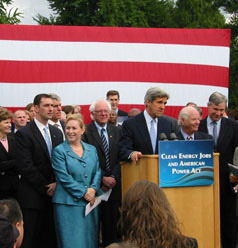
|  |  |  Editorials | Environmental | October 2009 Editorials | Environmental | October 2009  
US Senators Unveil New Climate Change Bill
 Renee Schoof - McClatchy Newspapers Renee Schoof - McClatchy Newspapers
go to original
October 01, 2009


| | Sen. John Kerry speaks at the rally for the Clean Energy Jobs and American Power Act at the Capitol Building in Washington, DC. (Sierra Club/flickr) |  |
Washington - On a stage in front of the Capitol with a giant American flag behind them, a group of senators Wednesday unveiled a new climate bill that they say will increase jobs and reduce the billions spent on foreign oil.

The bill's framework is similar to one that squeaked through the House in June. It orders mandatory reductions of heat-trapping gases by large companies and provides incentives and support for clean energy. It goes further, however, with more support for continued use of coal but with the emissions greatly reduced, and for increased reliance on nuclear power and natural gas.

Those provisions are intended to pull in more support from fence-sitting or opposing senators. Details in the bill remain to be filled in, and supporters face an uphill fight getting enough votes to clear the Senate's 60-vote requirement. Democratic supporters argue that the bill - which they're calling the Clean Energy Jobs and American Power Act - puts American interests first.

"We know clean energy is the ticket to strong economic growth," said Sen. Barbara Boxer, D-Calif., chair of the Senate Environment and Public Works Committee, who cited a recent University of California study that found the House version of the bill would create 1.9 million new jobs and increase household income.

Sen. John Kerry, D-Mass., who wrote the bill, said a transition to cleaner energy would reduce the billions of dollars spent on oil, some of which supports terrorists.

"Washington is used to letting Big Oil and special interests stand between us and the goals of everyday citizens," Kerry said. "Our security and our economy will both be strengthened and we cannot afford not to act."

Kerry said the bill supports all forms of energy - including coal, natural gas and nuclear energy - but makes them cleaner and more efficient.

Emissions reductions would be required only by large companies that emit 25,000 tons of carbon or more per year. Farms, homes and small businesses are exempt, Kerry said.

Even so, the bill would cover three-quarters of the nation's emissions of heat-trapping gases. The required reductions would reduce global warming pollution by 20 percent from 2005 levels by 2020, slightly more than the 17 percent in the House bill, and 83 percent by 2050, the level consistent with what scientific studies say will be necessary to prevent destructive warming that brings coastal inundation, more frequent heat waves, extinction of species and other results of a climate shift.

The new measure also adds a provision to keep the cost of the measure down - a ceiling on the price of the allowances that companies would pay for the right to emit greenhouse gases into the atmosphere. It also contains stronger oversight of the market in which companies would buy and sell those allowances. |

 |
|  |



